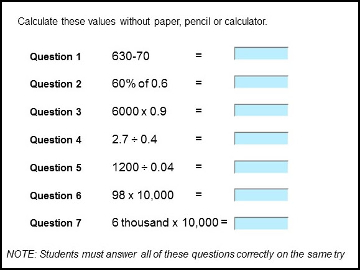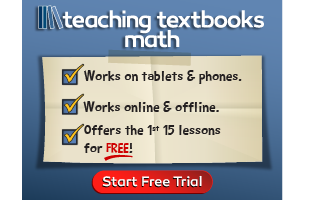CSM is an online, adaptive course that teaches educational and attitudinal competencies that are essential for college, work, and life. It does this in the context of reviewing practical math and a few language arts skills. The curriculum consists of five units:
- Number Sense and Mental Math
- Units and Measurements
- Mathematical Applications
- Problem Solving
- Literacy and Information Extraction
As you can see, it primarily addresses math. It reviews skills such as working with percentages, reading graphs, converting measurements, computing interest, working with fractions, and comparing financing options. Under language arts, it reviews topics such as capitalization, correct word usage, contractions, punctuation, scanning paragraphs for information, and connecting multiple pieces of information. Along the way, it also addresses other practical skills such as strategic planning, filling out invoices, and reading time schedules. Most CSM students improve their reading skills since close reading and analysis is required for many of the exercises. The publisher tells me that students typically spend about 80% of their time reading informational text material.
CSM uses the academic content as a vehicle to help students develop personal qualities that will help them in many situations. For example, if a student can gain self-confidence and persistence, those qualities will help him or her in school, in the job market, in the work world, and in their ability to conquer new tasks on their own.
In the CSM Curriculum Guide, it says: “CSM is an online, self-paced course that builds high-performance skills and traits.” Among the skills and traits listed are:
- "problem solving strategies and mindset
- the ability to learn new skills independently
- the persistence to push through problems and the resilience to bounce back from failures
- high personal expectations to do things right and to the best of your ability
- strong self-efficacy: The belief informed from personal experience that you can do what you try to do, and do it well" (p. 3).
These "soft skills" are often difficult for a student to learn. I’ll give you an example of how CSM helps students develop one of these skills—persistence. CSM requires 100% mastery of each item rather than passing students with a lower percentage of correct answers. So they are given plenty of time to work on an individual item, especially problems that are complex with multiple steps. Students can get help if they need it, and they can choose how much help they want, such as choosing from instruction on the basic concept, tips, or step-by-step help with solving the problem. If a student struggles with a concept, it will be introduced again later, sometimes through different avenues. Sometimes the program will shift to another type of skill or problem to keep the student from getting frustrated, then return later to the troublesome type of problem. Students have to keep trying until they get it.
The program adapts as students answer each question (or struggle with it), providing questions that will challenge students at the right level and in a way that suits the student’s learning style. Because of its design, the course might take anywhere from 25 to 75 hours to complete.
There’s lots of encouragement as students work toward acquiring yellow, red, and black belts, mimicking the karate-belt system. Repeated evidence of mastery of each type of skill is required to advance through the belt levels. When students learn a skill, the program offers praise and helps them overcome the habit of “learned helplessness” by showing them graphs that indicate the level of difficulty in relation to the general population. It might say something like, "Only 20% of all adults and 40% of college graduates could do that problem.” The idea is to give students a sense of accomplishment and personal ability.
While college preparation is mentioned frequently in CSM’s promotional information, the academic content addressed by this course seems more geared for those aiming for an associate degree, apprenticeship, or something other than a traditional four-year degree. For instance, CSM says that the course teaches college-level quantitative reasoning, but it does not require students to know all of the content from high school level algebra and geometry courses—minimal prerequisites for college math courses. However, the thinking required for many questions is at the adult level, using many workplace and real-life applications rather than higher math.
CSM should be particularly helpful for struggling students who doubt their ability to learn. However, the soft skills taught in the course might be needed by students who are college-bound and meet academic requirements but still lack confidence and persistence when confronted by new tasks. In addition, CMS can also help academically strong students who need to accept greater personal responsibility.
Even though the CSM course is unusual, the American Council on Education has recommended it for credit. Some colleges, especially non-traditional institutions such as Thomas Edison State University and Southern New Hampshire University, grant math credit for it.








